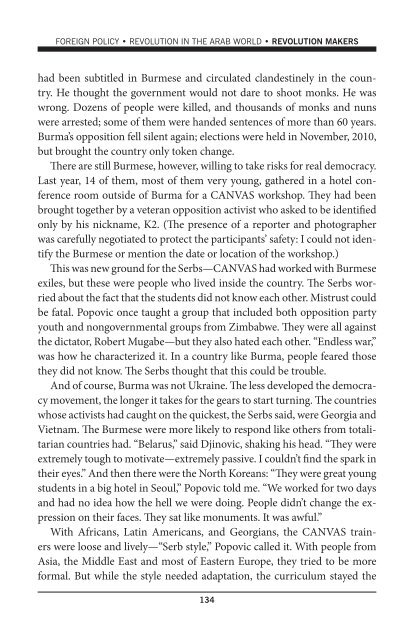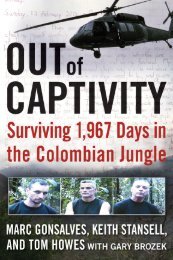Revolution in the Arab World - Observation of a lost soul Blog
Revolution in the Arab World - Observation of a lost soul Blog
Revolution in the Arab World - Observation of a lost soul Blog
Create successful ePaper yourself
Turn your PDF publications into a flip-book with our unique Google optimized e-Paper software.
foreign policy • revolution <strong>in</strong> <strong>the</strong> arab world • revolution makers<br />
had been subtitled <strong>in</strong> Burmese and circulated clandest<strong>in</strong>ely <strong>in</strong> <strong>the</strong> country.<br />
He thought <strong>the</strong> government would not dare to shoot monks. He was<br />
wrong. Dozens <strong>of</strong> people were killed, and thousands <strong>of</strong> monks and nuns<br />
were arrested; some <strong>of</strong> <strong>the</strong>m were handed sentences <strong>of</strong> more than 60 years.<br />
Burma’s opposition fell silent aga<strong>in</strong>; elections were held <strong>in</strong> November, 2010,<br />
but brought <strong>the</strong> country only token change.<br />
There are still Burmese, however, will<strong>in</strong>g to take risks for real democracy.<br />
Last year, 14 <strong>of</strong> <strong>the</strong>m, most <strong>of</strong> <strong>the</strong>m very young, ga<strong>the</strong>red <strong>in</strong> a hotel conference<br />
room outside <strong>of</strong> Burma for a CANVAS workshop. They had been<br />
brought toge<strong>the</strong>r by a veteran opposition activist who asked to be identified<br />
only by his nickname, K2. (The presence <strong>of</strong> a reporter and photographer<br />
was carefully negotiated to protect <strong>the</strong> participants’ safety: I could not identify<br />
<strong>the</strong> Burmese or mention <strong>the</strong> date or location <strong>of</strong> <strong>the</strong> workshop.)<br />
This was new ground for <strong>the</strong> Serbs—CANVAS had worked with Burmese<br />
exiles, but <strong>the</strong>se were people who lived <strong>in</strong>side <strong>the</strong> country. The Serbs worried<br />
about <strong>the</strong> fact that <strong>the</strong> students did not know each o<strong>the</strong>r. Mistrust could<br />
be fatal. Popovic once taught a group that <strong>in</strong>cluded both opposition party<br />
youth and nongovernmental groups from Zimbabwe. They were all aga<strong>in</strong>st<br />
<strong>the</strong> dictator, Robert Mugabe—but <strong>the</strong>y also hated each o<strong>the</strong>r. “Endless war,”<br />
was how he characterized it. In a country like Burma, people feared those<br />
<strong>the</strong>y did not know. The Serbs thought that this could be trouble.<br />
And <strong>of</strong> course, Burma was not Ukra<strong>in</strong>e. The less developed <strong>the</strong> democracy<br />
movement, <strong>the</strong> longer it takes for <strong>the</strong> gears to start turn<strong>in</strong>g. The countries<br />
whose activists had caught on <strong>the</strong> quickest, <strong>the</strong> Serbs said, were Georgia and<br />
Vietnam. The Burmese were more likely to respond like o<strong>the</strong>rs from totalitarian<br />
countries had. “Belarus,” said Dj<strong>in</strong>ovic, shak<strong>in</strong>g his head. “They were<br />
extremely tough to motivate—extremely passive. I couldn’t f<strong>in</strong>d <strong>the</strong> spark <strong>in</strong><br />
<strong>the</strong>ir eyes.” And <strong>the</strong>n <strong>the</strong>re were <strong>the</strong> North Koreans: “They were great young<br />
students <strong>in</strong> a big hotel <strong>in</strong> Seoul,” Popovic told me. “We worked for two days<br />
and had no idea how <strong>the</strong> hell we were do<strong>in</strong>g. People didn’t change <strong>the</strong> expression<br />
on <strong>the</strong>ir faces. They sat like monuments. It was awful.”<br />
With Africans, Lat<strong>in</strong> Americans, and Georgians, <strong>the</strong> CANVAS tra<strong>in</strong>ers<br />
were loose and lively—“Serb style,” Popovic called it. With people from<br />
Asia, <strong>the</strong> Middle East and most <strong>of</strong> Eastern Europe, <strong>the</strong>y tried to be more<br />
formal. But while <strong>the</strong> style needed adaptation, <strong>the</strong> curriculum stayed <strong>the</strong><br />
134




